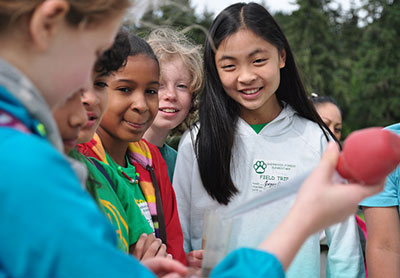 GCSAA has officially assumed leadership for First Green, with a new logo and website to promote the program centered on golf courses as environmental “learning labs” for students in middle school to 12th grade.
GCSAA has officially assumed leadership for First Green, with a new logo and website to promote the program centered on golf courses as environmental “learning labs” for students in middle school to 12th grade.
GCSAA brought the 21-year-old First Green under the GCSAA umbrella of member programs five months ago in cooperation with its philanthropic organization, the Environmental Institute for Golf. With its nearly 18,000 members from 78 countries and its 99 local chapters, GCSAA has committed resources to expand and enhance several aspects of First Green operations and marketing.
First Green provides hands-on STEM (science, technology, engineering and math) education at golf courses. Studies fall within the focus of schools’ environmental science and horticulture curriculums.
Teachers and golf course superintendents work together to tailor lesson plans to the school’s curriculum. First Green field trip kits and study guides make it easy to quickly organize and host field trips. When the students arrive, the golf course environment becomes the star. Putting greens morph into math problems; sand, clay and silt offer lessons in soil science; and small streams transform into living laboratories for experiments with water sources, quality and flow rate.
“Growing the profession and the game of golf among future generations is a vital part of our mission,” says Rhett Evans, GCSAA CEO. “Our members’ scientific knowledge base that enhances the enjoyment of the game for so many golfers will now be shared with students around the world with GCSAA’s expansion of First Green’s network beyond its roots in the Pacific Northwest.”
Founded in 1997, First Green is the only STEM education and environmental outreach program that uses golf courses as learning labs. Each field trip averages 75 students who learn about golf and the environment. For most students, these outdoor classrooms represent their first exposure to a golf course.